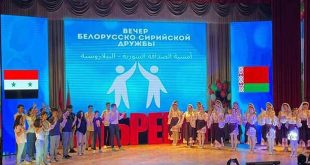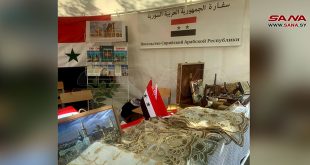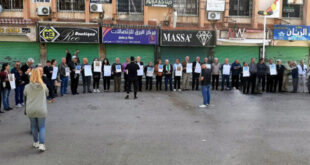Damascus, SANA – Deputy Prime Minister, Foreign and Expatriates Minister Walid al-Moallem said that Syria’s priority is combating terrorism and carrying out local reconciliation as a path towards a political solution, asserting the government’s commitment to defending national sovereignty and to not allowing anyone to breach it.
In a joint press conference with Foreign Affairs Minister of Belarus Vladimir Makei held in Damascus on Monday, al-Moallem said that Syria responds to any initiative that is based on international law, prioritizes cutting off the sources of terrorism, and supports inter-Syrian dialogue.
He said that what Russia did via its initiative to hold meetings in Moscow between a delegation from the government with opposition groups was something that the West failed to do, thanking the Russian friends for the initiative and affirming that the Syrian government is determined to pursue this effort to arrive at an inter-Syrian dialogue in Damascus.
Al-Moallem welcomed Makei who came to Syria to express his country’s support for Syria and to discuss prospects of cooperation in various fields, saying that Makei held constructive and productive talks with President Bashar al-Assad and Syrian officials.
In response to a question on developments following the execution of the Jordanian pilot by ISIS and how the Syrian government views the matter, al-Moallem said that Syria has condemned this crime and expressed condolences to the pilot’s family and to the Jordanian people, in addition to calling on the Jordanian government to coordinate with Syria in counterterrorism despite knowing in advance that Jordan doesn’t have the independent decision-making needed to carry out such cooperation.
“Jordan is part of an international alliance led by the U.S. and is part of the process that sends terrorists through its borders after training them in camps in Jordan under U.S. supervision,” he said, adding that Jordan which is fighting ISIS for personal reasons doesn’t fight Jabhet al-Nusra which is present at its borders.
Al-Moallem asserted that so far, there’s no Syrian-Jordanian cooperation in the field of counterterrorism, adding “regarding all that is published by the press on land forces entering Syria, I will clearly say that we are committed to defending Syrian sovereignty, and we will not allow anyone to breach our national sovereignty. We don’t need land forces to enter and fight ISIS; the Syrian Arab Army is carrying out this task valiantly.”
On the visit of UN Special Envoy on Syria Staffan de Mistura scheduled for Tuesday and whether his idea for freezing fighting in Aleppo is still valid in light of developments on the ground in favor of the Syrian Arab Army, al-Moallem said that de Mistura’s initiative was focused on Aleppo city itself and not its countryside, and that he was welcomed not because one side or another exerted pressure, but because the Syrian government wanted to implement an agreement that keeps Aleppo stable and intact and restores normal life to it.
He noted that de Mistura’s assistant, Ramzy Ezzeldin Ramzy, held talks with Syrian Deputy Foreign and Expatriates Minister Fayssal Mikdad, and the gist of these talks was that de Mistura has new ideas he’d like to propose on his plan, adding “we’re ready to hear him out.”
Regarding international humanitarian organizations and cooperation with them, al-Moallem reiterated the Syrian government’s commitment to cooperating with them, particularly in the humanitarian field, stressing the need to keep aid from being politicized and to have cooperation between these organizations on one side and the Syrian government and the Syrian Arab Red Crescent on the other side.
The Minister asserted that the Syrian government exerts great efforts to deliver aid to areas that need it, but several instances took place where armed groups seized the aid, with the most recent example of such incidents taking place two days ago in Yarmouk Camp.
Al-Moallem pointed out that international organizations constantly complain of their own lack of financial resources due to the donors’ hesitation to increase donations, which led to the Syrian government contributing with more than 70% of the aid being provided.
“We keep hearing from states that conspire against Syria and that pay billions of dollars to terrorists that they are concerned about the Syrian people and their lives, and these same states don’t ask themselves about who is causing the shedding of Syrian blood,” he said.
For his part, Makei voiced confidence that Syria is capable of emerging from the crisis stronger than it was before, and that there are great prospects for cooperation between the two countries.
He said that Belarus believes that resolving the crisis in Syria can’t be done by supporting terrorist organizations; rather it can only be resolved by dialogue, asserting his country’s readiness to help invigorate and develop Syria’s economic capabilities, adding that the agreements that were signed during his visit will help expand bilateral cooperation.
Makei said that the high-level meetings he conducted in Damascus reflect the level of agreement between the two countries, noting that he met President al-Assad and delivered to him a letter from President of Belarus Alexander Lukashenko expressing support for Syria in its fight against terrorism.
He said that Belarus believes in a multipolar world of sovereignty, equality, and respect, calling on the international community and forces that truly care for Syria to help resolve the crisis peacefully and abandon military force.
On how Belarus can help resolve the crisis in Syria and how to implement the agreements signed by the two countries, Makei said that during his visit he discussed prospects of expanding cooperation to match the level of political discourse between the two countries, with the two sides agreeing to make a list of top-priority issues which will be discussed during a joint committee meeting in Minsk soon, where one of the issues on the table is aiding the reconstruction process in Syria.
He said that both countries have products that interest the other side, and that the plan is to quadruple trade exchange between Syria and Belarus.
Makei said Belarus has a very clear definition of terrorism, and it always opposes any foreign interference in any state’s internal affairs, noting that sometimes this interference is done through economy or by sending terrorists to the state in question.
He said it’s futile to try to categorize terrorists as “good or bad” and asserted that the Syrian government is at the forefront of combating terrorism, warning that a threat to one country can have effects on all other countries, adding that European countries now understand that what is happening in Syria will not lead to good things for them, as shown by the example of Libya and other countries like it.
Hazem Sabbagh
 Syrian Arab News Agency S A N A
Syrian Arab News Agency S A N A




